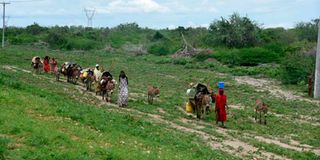Tana Delta women train as paralegals to fight GBV

Women from Orma community in Tana River County moving with their belongings in search of greener pastures. The UNDP has introduced a legal training for women from pastoralist communities in the Tana Delta.
What you need to know:
- The UNDP through the Kenya Community Support Centre has introduced a program where they are enrolling tens of women from pastoralist communities in the Tana Delta into a legal aid program.
- The one-week program takes the women through training on human rights and basic legal procedures related to GBV.
Retrogressive cultures and traditions have suppressed the voices of women in pastoralist communities in Tana River County, exposing them to gender-based violence.
Women in respective communities are never allowed to speak in meetings and in the event they attend any, they are expected to sit far from the men and listen. Any attempt by a woman to counter decisions made against them has previously been dealt with harshly.
This is bound to change soon. The United Nations Development Program (UNDP) through the Kenya Community Support Centre (Kecosce) has introduced a program where they are enrolling tens of women from pastoralist communities in the Tana Delta into a legal aid program. The women gathered from villages in Garsen, are getting the free training to become paralegals.
The one-week program that has been running for five months now, takes the women through training on human rights and basic legal procedures related to GBV.
Speaking to nation.africa in Garsen last week, Kecosce Legal Aid Program Officer Stephen Otoi, said the training seeks to educate the women on basic law and the arms of the Judiciary.
Social injustice
The training also focuses on equipping individuals with clauses in the Constitution that speak about social injustice.
“They will be able to register cases, find lawyers for victims or even stand in to argue cases for the victims; where the court is convinced they are capable, they will act as lawyers in those cases,” he said.
Mr Otoi noted that the program has so far, reached more than 30 women and looks forward to reaching more from the most vulnerable communities amid dissenting voices from particular groups.
“I have learned that I have a voice and that there is a government that cares so much about women and children, it is an eye-opener,” said Mariam Hassan, a beneficiary.
Ms Hassan said the knowledge will help her and other women understand how to challenge the retrogressive culture and traditions.
The program brings on board the expertise of skilled lawyers and judges who share their knowledge on basic law and defence in court.
Ms Hassan said that even though certain things the community's culture and traditions encourage appear normal, they are social injustices that have helped other capital crimes thrive.
Formal education
“Physical abuse against women has been a normal thing for a while. It is now that I'm learning that it is a crime that can earn someone years in prison,” she narrated.
Arina Gacal, another beneficiary, said the training will equip the women with law and encourage them to speak openly for themselves.
“At least I have learned how to record a statement with the police and how to argue my case in court as well as follow up the same case proceedings; with this nobody can short-change me in getting justice,” she added.
Speaking separately to nation.africa in Hola, Tana River County Police Commander Emmanuel Mwaringa, said chiefs in pastoralist communities register at least 12 cases of gender-based violence every month.
“These are areas that are yet to adapt fully to civilisation; assault against women is rampant followed by, defilement, rape, and female genital mutilation,” he said.
According to the county police boss, women in these communities barely have formal education hence, are not aware of their rights.





